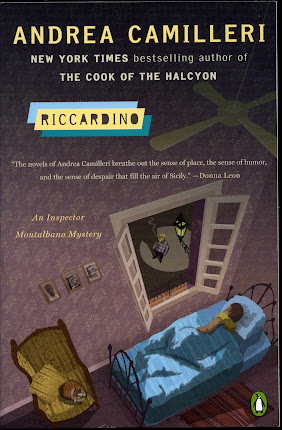Andrea Camilleri, the Sicilian novelist who died at age 94 in 2019 wrote 28 novels featuring his police inspector Salvo Montalbano. He was 69 when he wrote his first Montalbano novel The Shape of Water.
In 1994 Camilleri published the first in a long series of novels: La forma dell'Acqua (The Shape of Water) featured the character of Inspector Montalbano, a fractious detective in the police force of Vigàta, an imaginary Sicilian town. The series is written in Italian but with a substantial sprinkling of Sicilian phrases and grammar. The name Montalbano is a homage to the Spanish writer Manuel Vázquez Montalbán;[6] the similarities between Montalban's Pepe Carvalho and Camilleri's fictional detective are noteworthy. Both writers make use of their protagonists' gastronomic preferences.
Wikipedia
In my reading life I have read many mystery novelists like
Raymond Chandler, Jerome Charyn, J.Robert Janes, P.D. James, Dashiel Hammett,
Reginald Hill, Paco Taibo II, Agatha Christie, Ruth Rendell, Reginald Hill, Ian
Ranking, Daphne du Maurier Graham Greene, Donna Leon, Leslie Charteris, Leonardo Padura, Ian Fleming and Alexander McCall
Smith. In every one of those authors I read their complete output. I could never stop at one or two.
I can say that I have read all of Camilleri’s Montalbanos and I can add with great joy that my Rosemary also read all of the Montalbanos. Perhaps she liked his style of writing as I explain below in the next paragraph. Camilleri was one of the few authors I shared with Rosemary. She and I saw all the Italian series. The mix of the Italian and Sicilian Italian was so similar to my Argentine Spanish that after a few minutes I understood almost everything said. Because each episode was about one hour and forty five minutes there was nice character development and better still they were all faithful to the novels. The music sounded like an Italian version of Ástor Piazzolla.
I have yet to read an explanation on his style. Consider that while Camilleri had written non fiction before 1994 he was 69 when he started the Montalbanos. They had short chapters and his sentences to me (I am unlearned on this matter but then…) are short and to the point Hemingwayesque.
When Camilleri died, I was heartbroken. I did not know that in 2005 he decided not to write any more of his series. Most of us did not know that there was a last one, Riccardino which was only published a month ago.
So this book, in some strange way for me, is a posthumous novel that is a posthumous gift.
I had a couple of connections (remote) with Camilleri. One was Spanish author Manuel Vásquez Montalbán. In a blog I wrote this:
I made the decision that I had to read at least one Montalbán novel. I looked at the Vancouver Public Library’s on line catalogue and I was astounded to find that they had Quinteto Buenos Aires and in Spanish! This novel (in spite of the title) was written in 1997 when Argentina was still living the agony of bringing back the perpetrators of the desaparecidos (the proceso as they call it in Argentina). The novel’s quintet features a man who dresses up as Robinson Crusoe, his man servant (a black man) Friday, a parrot, a llama and a woman sometimes called Bertha and sometimes Alma.
My other faint connection with Camilleri is my admiration for Cuban born (long gone) Alejo Carpentier who invented the concept and called it that “lo real maravilloso” or magic realism. Some years ago I took out and read all the Carpentiers in Spanish which they had available at the UBC Library. I used my Alexandra’s library card!
In one of the Montalbano’s the inspector is driving with his girlfriend Livia. As they approach a small town, he says to her, “We will avoid this town as they are making one of my TV series there and the chap who plays me is fat.”
In another, Montalbano picks up a public phone and calls Camilleri to tell him that he will refuse what he is supposed to do.
I will not reveal the content in Riccardino that containls lots of activity between author and protagonist.
I have an affinity for the word posthumous of which I have written a few blogs. I will list them below. The word comes from Latin and it means after burial.
A Posthumous Gift Beyond the Grave - Rosemary
A Posthumous Gift - John Tuytle
Beyond the Grave a Posthumous Gift to my mother
